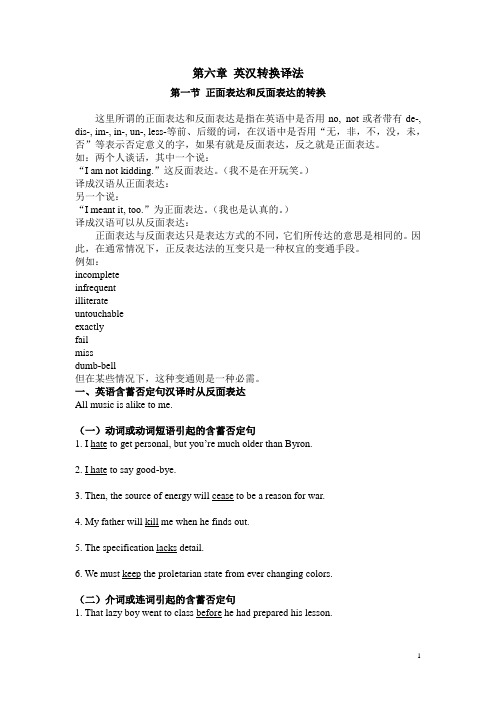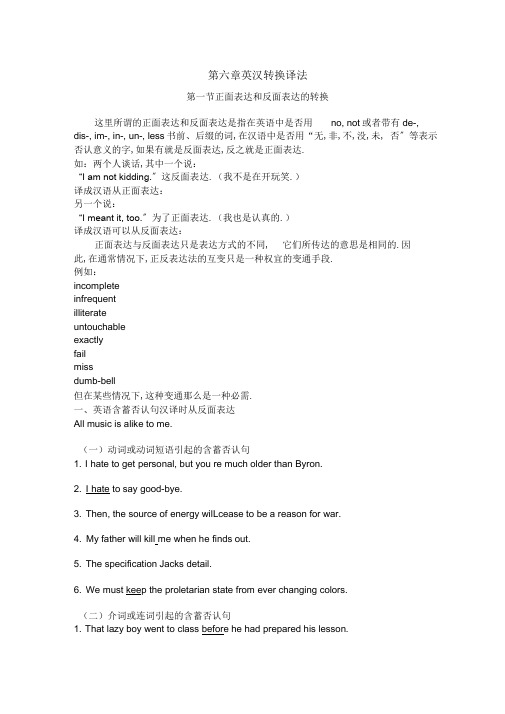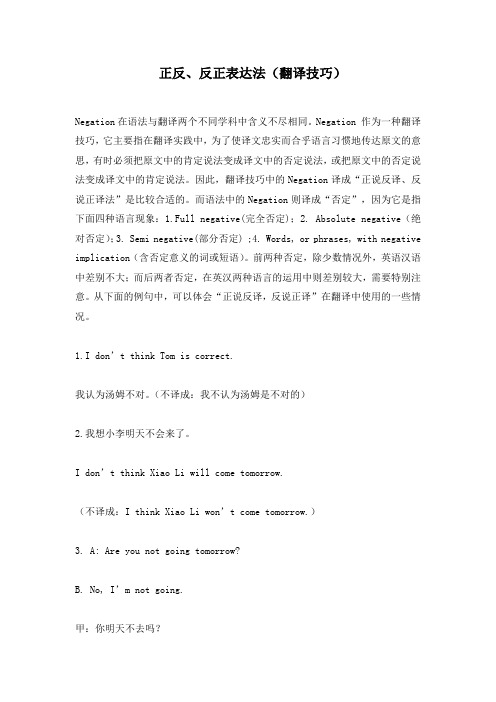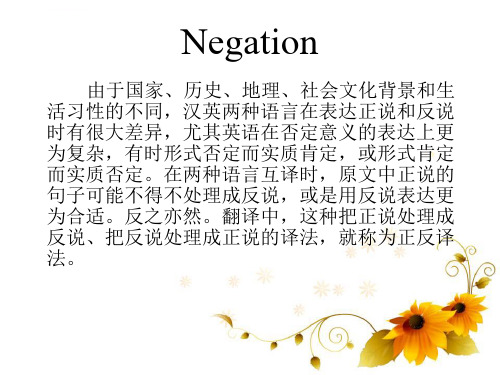英汉翻译中的正反表达法共27页
第六章 英汉转换译法 (英文)第一节 正面表达和反面表达的转换

第六章英汉转换译法第一节正面表达和反面表达的转换这里所谓的正面表达和反面表达是指在英语中是否用no, not或者带有de-, dis-, im-, in-, un-, less-等前、后缀的词,在汉语中是否用“无,非,不,没,未,否”等表示否定意义的字,如果有就是反面表达,反之就是正面表达。
如:两个人谈话,其中一个说:“I am not kidding.”这反面表达。
(我不是在开玩笑。
)译成汉语从正面表达:另一个说:“I meant it, too.”为正面表达。
(我也是认真的。
)译成汉语可以从反面表达:正面表达与反面表达只是表达方式的不同,它们所传达的意思是相同的。
因此,在通常情况下,正反表达法的互变只是一种权宜的变通手段。
例如:incompleteinfrequentilliterateuntouchableexactlyfailmissdumb-bell但在某些情况下,这种变通则是一种必需。
一、英语含蓄否定句汉译时从反面表达All music is alike to me.(一)动词或动词短语引起的含蓄否定句1. I hate to get personal, but you’re much older than Byron.2. I hate to say good-bye.3. Then, the source of energy will cease to be a reason for war.4. My father will kill me when he finds out.5. The specification lacks detail.6. We must keep the proletarian state from ever changing colors.(二)介词或连词引起的含蓄否定句1. That lazy boy went to class before he had prepared his lesson.2. Mr. Smith was above reproach.3. Her beauty is beyond compare.4. Instead of Mr. Black, Mr. White delivered a speech at the meeting.当but, except, except for, barring, besides等词义相当于leaving out时,均宜译成反说式,以免引起词义含混。
正反译法ppt课件

一、 正说反译法
可编辑课件PPT
19
(八)句子
(1) His grandmother is already 80, but she carries her years lightly.
他祖母已80岁了,可是并不显老。
(2) I am wiser than to believe such stories. 我还不至于蠢到竟然相信这种谎言。
16
(4) Wear your coat or you’ll catch cold. 穿上大衣,不然你会着凉的。
(5) Unless England improve their game, they’re going to lose the match. 英格兰队如果不改进打法,就会输掉这场 比赛。
可编辑课件PPT
17
(七)某些固定短语
(1) The escaped criminal is still at large. 逃犯仍未捉拿归案。
(2) There are many energy sources in store. The problem has been to use the energy at a reasonable cost. 有许多能源尚未开发。问题始终是要以一个合理的代价利 用这些能源。
可编辑课件PPT
1
鉴于此,我们在翻译某些含有否定意义的英文句子时,应 当特别注意两点:一是英语里有些从正面表达的词语或句 子,汉译时可以从反面来表达,即正说反译法 (negation);二是英语里有些从反面表达的词语或句子, 汉译时可从正面来表达,即反说正译法(affirmation)。 例如:。
一、 正说反译法
可编辑课件PPT
10
(3) The explanation is pretty thin. 这种解释理由很不充分。
第六章英汉转换译法第一节正面表达和反面表达的转换

第六章英汉转换译法第一节正面表达和反面表达的转换这里所谓的正面表达和反面表达是指在英语中是否用no, not或者带有de-,dis-, im-, in-, un-, less书前、后缀的词,在汉语中是否用“无,非,不,没,未, 否〞等表示否认意义的字,如果有就是反面表达,反之就是正面表达.如:两个人谈话,其中一个说:“I am not kidding.〞这反面表达.(我不是在开玩笑.)译成汉语从正面表达:另一个说:“I meant it, too.〞为了正面表达.(我也是认真的.)译成汉语可以从反面表达:正面表达与反面表达只是表达方式的不同, 它们所传达的意思是相同的.因此,在通常情况下,正反表达法的互变只是一种权宜的变通手段.例如:incompleteinfrequentilliterateuntouchableexactlyfailmissdumb-bell但在某些情况下,这种变通那么是一种必需.一、英语含蓄否认句汉译时从反面表达All music is alike to me.(一)动词或动词短语引起的含蓄否认句1. I hate to get personal, but you re much older than Byron.2. I hate to say good-bye.3. Then, the source of energy wilLcease to be a reason for war.4. My father will kill me when he finds out.5. The specification Jacks detail.6. We must keep the proletarian state from ever changing colors.(二)介词或连词引起的含蓄否认句1. That lazy boy went to class before he had prepared his lesson.2. Mr. Smith was above reproach.3. Her beauty is beyond compare.4. Instead of Mr. Black, Mr. White delivered a speech at the meeting.当but, except, except for, barring, besides等词义丰目当于leaving out 时,均宜译成反说式,以免引起词义含混.(三)名词引起的含蓄否认句1. A few instruments are in a state of neglect.2. We cannot finish the work in the absence of these conditions.3. She was at a loss what to do.(四)形容词及其短语引起的含蓄否认句1. I am far from considering it perfect.2. The newspaper accounts are far from being true.3. We must be free from arrogance and rashness and learn from people.4. He is the last man I want to see.5. Present supplies of food are short of requirements.(五)too, but引起的含蓄否认句too, but在一定的上下文中具有否认的含义,因此,含有这两个词的英语句子往往要译为了汉语的否认句.1. But for your efficiency, our timely communication should have been impossible.2. He is too much of a coward to shoot.3. His mother is anything but angry.4. I ll do anything but that.5. I would go with you but that I am so busy.6. He is anywhere to be found_but in his office.(六)有些肯定的比拟句含有否认的意义,可译为了汉语的否认句1. You ought to know better than to do that sort of thing.2. Your temper is more than I can bear.3. There is more in it than you imagine.4. The hero would rather die than surrender.5. I, rather than you, should do the work.6. I ll buy it!二、某些英语否认结构译时从正面表达有些英语句子虽然是从反面表达的, 但它们的意义却是肯定的,翻译时根据汉语的表达习惯从正面表达.(一)形容词1. I will never be so ungrateful as even to think he has done an act of injustice by me.2. It is well you wish this behind her back, else you would have but an unquiet house." said Nerissa.(二)名词1. To say the truth, there is but on work in His whole creation that doth Him any dishonor, and with that I have long since avoided holding any conversations.2. Mr. Square happened to be at church on the Sunday, when, the appearance of Molly in her sack had caused al that disturbance.3. He manifested a strong dislike for his fathers business.(三)动词1. He had not the least difficulty in discovering the true cause of his present behavior.2. Some well-chosen present from the philosopher so softened and unguarded the girl s heart.3. As the door was fastened, which gave her an opportunity of conveying her lover behind that rug or blanket where he now was unhappily discovered.(四)副词1. On the contrary, had she been confined to the choice of one only, Tom Jones would undoubtedly have been of the two victorious persons.2. Our other grandson looks unbelievable like Byron as an infant.3. He stood for a while motionless, and seemed equally at a loss what to say orwhither to direct his eyes.4. Byron walked uncertainly to the cry girl.(五)短语英语中有些短语形式上是否认的,但表达的内容却是肯定的.如:not-• until, never-without, no one but等,含有这些短语的句子,译成汉语时大多从正面表1. They gave me the wrong book, and I didrit notice it until I got back to my room.2. Don' drive back till these bastards quit, or you may get strafed.3. No one but a great philosopher could solve such a question.4. How are you?〞“ couldn't feel better.〞5. The reader may suppose Mrs. Miller received this account with great thankfulness and no less pleasure.(六)句子1. There is no rule but has exceptions.2. I never go past that school but think of my first teacher.3. You cari t be too careful.4. I' m not a little afraid of snakes.三、双重否认结构的译法(一)译为了双重否认句使用双重否认句的目的是起强调作用, 或使语气委婉.翻译时如果保存原文的“否认之否认〞形式并不影响中文的流畅,那么保存为了好.这样可以突出原文的强调作用或委婉语气.1. I cannot let your statement pass unquestioned.2. There can never be a force acting in nature unless two bodies are involved.3. He was not unequal to the duty.4. I could not translate certain passages_wilhout challenging them.5. She never willingly suffered any one to depart from her house without inquiring as much as possible into their names, families and fortunes.6. Now no spaceship cannot be loaded with man.(二)译为了肯定句如果保存原文的双重否认形式不能得到流畅的译文,那么译为了汉语的肯定句.1. Nowadays it is not seldom that a man lives to be seventy years old.2. There can be_no sunshine without shadow.3. I am not insincere about it.4. She is not a little interested in American literature.5. The flowing of electricity through a wire is not unlike that of water through a pipe.。
翻译技巧之正译与反译

free from(不受。。。的影响(yǐngxiǎng),没有。。。的) Free from anxiety 无忧无虑。 Free from arrogance and rashness 不骄不躁。 Every person has the right to be free from hunger. 人人有不挨饿的权力。 These elements are shielded so that they are free
2020/12/24
22
22
第二十二页,共37页。
7) A dog in the manger. 占着茅坑(máokēng)不拉屎。
8) He who has a mind to beat his dog will easily find his stick. 欲加之罪,何患无辞。
2020/12/24
Negation: with no, not never, non-,un-,im-, in-, ir-,-less 不、没、无、未、别、休、莫、非、 毋、勿
Affirmation: without the words, prefixes, suffixes mentioned above.
2020/12/24 2
2020/12/24
18
18
第十八页,共37页。
1) She said idly, “well, what does it matter?” 她漫不经心的说:“哼,这有什么关系?”
2) Slowly he pulled the letter out of the envelope, and unfolded it.
第二页,共37页。
Affirmation in English→Negation in Chinese (英语里有些从正面(zhèngmiàn)表达的词或句子,译
第九章正反反正翻译法解析

English-Chinese Written Translation. Copyright (C) 2006 by Wei Jianhua All Rights Reserved
(1)动词:
excuse 对不起 lack 不足/没有 overlook 没有注意 refuse 不答应 hate 不喜欢
English-Chinese Written Translation. Copyright (C) 2006 by Wei Jianhua All Rights Reserved
(5)名词
little没有多少 ignorance 无知 in doubt 拿不准 refusal 不答应 out of place 不恰当/不在适当位置 absence 不在 anything but 概不/决不
●通常正面反译的单词:
miss 未赶上/未击中 fail 不及格/没有成功 ignore 不顾/不理 neglect 不注意 exclude 不包括 refrain from 忍不住… wonder 不知道 fancy 想不到 lose 抓不住 / 听不见/ 看不见
例: 1、The first bombs missed the target. 第一批炸弹没有击中目标。
1.The failure was the making of him. 这次不成功是他成功的基础。 2. The operation only just succeeded and it was fortunate that we had provided additional forces.
这次战役好不容易才取得胜利,也多亏我们增加了兵力。
English-Chinese Written Translation. Copyright (C) 2006 by Wei Jianhua All Rights Reserved
正反、反正表达法(翻译技巧)

正反、反正表达法(翻译技巧)Negation在语法与翻译两个不同学科中含义不尽相同。
Negation 作为一种翻译技巧,它主要指在翻译实践中,为了使译文忠实而合乎语言习惯地传达原文的意思,有时必须把原文中的肯定说法变成译文中的否定说法,或把原文中的否定说法变成译文中的肯定说法。
因此,翻译技巧中的Negation译成“正说反译、反说正译法”是比较合适的。
而语法中的Negation则译成“否定”,因为它是指下面四种语言现象:1.Full negative(完全否定);2. Absolute negative(绝对否定);3. Semi negative(部分否定) ;4. Words, or phrases, with negative implication(含否定意义的词或短语)。
前两种否定,除少数情况外,英语汉语中差别不大;而后两者否定,在英汉两种语言的运用中则差别较大,需要特别注意。
从下面的例句中,可以体会“正说反译,反说正译”在翻译中使用的一些情况。
1.I don’t think Tom is correct.我认为汤姆不对。
(不译成:我不认为汤姆是不对的)2.我想小李明天不会来了。
I don’t think Xiao Li will come tomorrow.(不译成:I think Xiao Li won’t come tomorrow.)3. A: Are you not going tomorrow?B. No, I’m not going.甲:你明天不去吗?乙:是的,我不去。
4. ①Africa is not kicking out Western Imperialism ②in order to invite other new masters.①非洲踢出西方帝国主义②并不是为了请进其他新的主子。
(假如不运用“正说反译,反说正译”这一技巧,译文就会成为:“非洲不踢出西方帝国主义为了请进其它新的主子。
正反、反正译法

(二)英译汉反说正译法:英语从反面表达, 汉语从正面表达
反正译是用变换语气的方法把原文的否定式译成 汉语的肯定式。翻译时运用这一方法可使译文自然 流畅。 英语中含有否定词语的结构和双重否定的结构常有 这种方法来解释。英语中表达否定意思的词或词组 指带有de-, dis-, im-, in-, un-, less-等词缀的词和 no, not, not…until, no less than, no more than, Nothing than, nothing but, cannot…too 等表示 否定的词或词组。
赶快把这封信寄出去。
She is no less diligent than her sister. 她和她姐姐一样用功。 Such things couldn’t long escape notice. 这类事情迟早会被人发觉的。 We did not notice this matter until yesterday. 直到昨天我们才注意到这件事。 We can not be too careful in doing experiments. 我们做实验越仔细越好。
(一)英译汉正说反译法:英语从正面表达, 汉语从反面表达
正反译是用变换语气的方法把原文的肯定式译成 汉语的否定式。翻译时运用这一方法可使译文合乎 汉语规范,更恰当地表达原文的意思。
例如, correct 可译成“没有毛病”,wonder可译成 “不知道”,exactly可译成“一点不错”,anythi but可译成“一点也不”等等。
Never too old to learn. 活到老,学到老。 I couldn’t agree more about it. 我对此非常赞同。 His story was nothing but lies. 他的那番话纯粹是谎言。 Our advice was not lost on him. 我们的劝告对他起了作用。 There is no rule but exceptions. 凡规则总有例外。 Don’t lose time in posting this letter.
正反、反正翻译法 ppt课件

The thought of returning to his native land never
deserted him.
归国的念头始终萦绕在他ppt课的件 心中。
16
(3)形容词
英文反面,译文正面
He was an indecisive sort of person and always
would probably have been a success. • 如果他不发脾气,谈判很可能已经成功了。 • The mistake escaped me. • 我没注意到这个错误。
ppt课件
6
正反、反正表示法
• (二)副词
• We may safely say so. • 我们这样说错不了。
• 在中文中,正面和反面表达主要是指是否
用“非”,“无”,“没(有)”,
“未”,“否”等字。
ppt课件
5
正反、反正表示法
• 一、英语从正面表达,译文从反面表达 • (一)动词 • Such a chance was denied me. • 我没有得到这样一个机会。 • If he had kept his temper, the negotiation
carefully and cautiously as he does the unfamiliar.
科学家们在处理熟知的事物时,必须像处理陌生
的事物一样小心谨慎。ppt课件
17
(四)名词
1.It was said that someone had sown discord among them. 据说有人在他们中间挑拨离间。
样的话。
Good winner, good loser. 胜不骄,败不馁。
英汉翻译中的正反表达法

习惯用法
28) He is anything but a writer. 译文:他决不是一个作家。 29)The islanders found themselves far from ready to fight the war. 译文:岛民发现自己远远没有做好作战准备。 30)The decision has to come. 译文:决定尚未作出。 31)It is a wise father that knows his own child. 译文:无论怎样聪明的父亲也不见得了解自己的孩 子。
形容词
12)The light in the classroom is poor. 译文:教室里的光线不足。 13)The explanation is pretty thin. 译文:这个解释站不住脚。 14)He was absent from his own country last year. 译文:他去年不在自己的国家。 15)At present it is generally accepted, although more as a self-evident statement than on the base of a closelyreasoned scientific proof. 译文:目前,这个观点已被普遍接受,虽然它是不言而喻的, 并不是根据科学严密推理而证明的。
翻译-正反、反正法.ppt

正说反译法 (Negation)
名词
副词 英语中有些否定概念是通过含有 动词或动词短语 否定意义或近似否定意义的词来表达 形容词或形容词短语 的。这类词从词形上看是肯定式 ,一 介词或介词词组 般被称之为“含蓄否定词”或“暗指 连接词及其短语 否定词”。英语中的含蓄否定词或含 蓄否定短语一般都要译成汉语的否定 某些固定短语
菲利普误了最后一班公共汽车,茫然不知该怎么办。
句子
His grandmother is already 80, but she carries her years lightly.
他祖母已80岁了,可是并不显老。
I am wiser than to believe such stories
我还不至于蠢到竟然相信这种谎言。
他走进那所危楼。
Examples
A radar screen is not unlike a television.
雷达荧光屏跟电视荧光屏一样。
Don’t stop working,” he said
他说:”继续干活吧。”
He knew he was mortally ill.
他知道他得的是不治之症。
从以上例子中,我们可以看到, 有些句子从正面译不顺,不妨从反面 译;反面译不顺,则不妨从正面译, 因为同一个概念,一个民族正着说, 以为是合乎表达习惯的,而另一个民 族则认为反着说才顺嘴。因此,在恰 当的场合灵活运用正反译法不失为确 保译文语义明晰、文从字顺的有效手 段。
Definition
英语里有些从正面表达的词语或句子,汉 译时可以从反面来表达,即正说反译法 (negation); 英语里有些从反面表达的词语或句子,汉 译时可从正面来表达,即反说正译法 (affirmation)。
翻译正说反译法讲解ppt课件

1. We may safely say so. 我们这样说万无一失。
2. The subversion attempts proved predictably futile. 不出所料,颠覆活动证明毫无效果。
3. The capability of sustainable development will be steadily enhanced; the cological environment will be improved. 可持续发展能力不断增强,生态环境得到改善。
(三)形容词
• “It is well you wish this behind her back, else you would have but an unquiet house.” said Nerissa. “亏了你是背着她这么希望,不然的话,你们家可 一定会闹得天翻地覆 的。”倪丽莎说。
2. He was an sort of indecisive person and always capricious.
他这个人 优柔寡断,而且总是反复无常。
3. All the articles are untouchable in the museum. 博物馆内一切展品禁止触摸。
严格执行突发事件上报制度、校外活 动报批 制度等 相关规 章制度 。做到 及时发 现、制 止、汇 报并处 理各类 违纪行 为或突 发事件 。
严格执行突发事件上报制度、校外活 动报批 制度等 相关规 章制度 。做到 及时发 现、制 止、汇 报并处 理各类 违纪行 为或突 发事件 。
反说正译
• 定义:反说正译,即英语从反面表达,译文从正 面表达。就是用转换语气的方法,把原文的否定 式译成汉语的肯定式。
正反反正译法

Strike while the iron is hot !
• On Sunday Jim idles away his time. • 星期天吉姆无所事事。 • The relay(继电器) acted vainly due to negligible current. • 电流太小,继电器不能启动。 • “It was the most influential private group,” says one of the founder members. • 该组织的创始人之一说:“这个组织曾是影响最大的非官方集 团 • She models between roles. • 她不演戏是做模特。
• Don't stop working! • 别停下来! • 继续干活! • He went into the insecure building. • 他走进那座不安全的楼。 • 他走进那座危楼.
Contents
1
What is affirmation and negation
2
Conversion from Affirmation to Negation
The English language has its peculiarities in negation. Of course, English-speaking people have their own way of thinking in the negation and expressing negative implications. What is affirmative in form in English may be implied something negative in Chinese, and vice verses-. The use of “yes” and “no” is a case in point.
正反翻译法

副词
• 1)Everyone felt nervous that afternoon,and they all went about their work in an unusually careful manner. 译文:那天下午,大家都感到紧张, 译文:那天下午,大家都感到紧张,干活时特别小心 谨慎。 谨慎。 • 2 It is the only possession that I have not given 2)It up. 译文:这是我所保留的唯一财产。 译文:这是我所保留的唯一财产。 • 3)The thought of returning to his native land never deserted him. 译文:归国的念头始终萦绕在他的心中。 译文:归国的念头始终萦绕在他的心中。
• • • •
Excuse me. He is above himself. We can’t wait to meet you. “对不起” “他自命不凡” “我们要立 对不起” 他自命不凡” 对不起 刻见到你” 刻见到你”
一、英译汉正说反译法--英译汉正说反译法 动词
少数特色动词,直译无法再现其隐含语义。 少数特色动词,直译无法再现其隐含语义。 1)“I have read your articles.I expect to ) . meet an old man.” . 译文: 我读过你的文章,没想到你这样年轻 你这样年轻。 译文:“我读过你的文章,没想到你这样年轻。” 2)Please remain seated while the plane is ) taking off. . 译文:飞机起飞时请不要离开座位。 不要离开座位 译文:飞机起飞时请不要离开座位。
介词
1)I do think that it is beyond his power to fulfill the task. 力所不及的 译文:我的确认为要完成这项任务是他力所不及 译文:我的确认为要完成这项任务是他力所不及的。 2)His answer is beside the mark.。 译文:他的回答文不对题 不对题。 译文:他的回答文不对题。 3)I have fallen behind with my correspondence. 译文:我有一些信件没有及时答复。 没有及时答复 译文:我有一些信件没有及时答复。 4)The lecture was interesting,but as far as I am concerned the speaker was speaking over my head. 译文:这讲座很有趣,但对我来说,讲座太深了,听不懂。 译文:这讲座很有趣,但对我来说,讲座太深了,听不懂。
英汉翻译法7——正反译法

⏹在翻译时,对于中国学生来说,某些否定句犹如陷阱,稍有不慎,就会掉入其中。
鉴于此,我们在翻译某些含有否定意义的句子时,应当把握两点:一、英语里有些从正面表达的词或句子,译文可从反面来表达,即正说反译法;二、英语里有些从反面表达的词或句子,译文可从正面来表达,即反说正译法。
例如:⏹1) Only five customers remained in the bar.⏹酒吧间只有五个顾客还没走。
⏹(原文从正面表达,译文从反面表达。
如译成“还留着”,或“还呆在那里”,则不如“还没有走”更符合汉语习惯。
)⏹2)Anyone wants to get out? Over my dead body!⏹只要我活着,谁也别想出去。
(the original English sentence implies “nobody can get out unless you kill me).⏹3) Mother said Father would come soon, but Mary knew better.⏹妈妈说爸爸很快就会来了,玛丽知道不会。
(“know better” implies that Mary thoug ht differently or disagreed with Mother, it means “think otherwise”)⏹5) A radar screen is not unlike a television.⏹雷达荧光屏跟电视荧光屏一样。
⏹(如译成“雷达荧光屏不是不象电视荧光屏一样”则不符合汉语习惯。
)⏹我们可以看到,正面译不顺,不妨从反面译;反面译不顺,不妨从正面译,因为同一个概念,一个民族正面说,认为是合乎表达习惯的,而另一个民族则认为反着说才顺嘴。
⏹下面从正说反译和反说正译这两个方面来探讨英语否定结构汉译的一般原则⏹一、正说反译法(Affirmative in English, but Negative in Chinese)⏹英语中的含蓄否定词或含蓄否定短语一般都要译成汉语的否定词组。
正反译法 讲解课件

类似的动词有:demobilize(复员);unfasten(解开); displease(使人生气)等。
二、反说正译法
(二)名词
The dishonesty of the city officials was exposed by the newspaper.
(五)副词
Time is what we want most, but what many use worst.
译文:时间是我们最缺少的,但偏偏许多人最不善于利用时间。
Little did we think that we would lose the
game. 译文:我们根本没想到会输掉比赛。
一、 正说反译法
(七)某些固定短语
The escaped criminal is still at large.
译文:逃犯仍未捉拿归案。
I was at a loss to understand what he alluded to.
译文:我无法领会到他谈话中所指的是什么。
The hotel was anything but satisfactory.
翻译有否定意义的英文句子时应 注意:
正说反译法---英语里有些从正面表达的句子或词语,汉 译时可从反面来表达。
Example::
Only five customers remained in the bar. 译文:酒吧间只有五个顾客没走。
原文从正面表达,译文从反面表达。如译成“还呆在那里”,则不如“还没走”更符合汉语习 惯。
在适当的场合灵活运用正反译法为确保译 文语义明晰,文从字顺的有效手段。
Please withhold the document for the time being.
正反、反正表达法

汉语中含有“不〞、“没有〞、“无〞、“非〞、 “未〞、“否〞“休〞、“勿〞、“别〞、“莫〞、 “毋〞等成分的词句,都称为反说或者称为否定。相 反,英汉语中不含这些成分的词句称为正说,即肯定。
【译文】这些事情经常发生。
10 返回章重点 退出
例3:No man can have too much
knowledge and practice.
【译文】知识和实践越多越好。
例4:That’s not a man that lives
who does not know his god-
like hours. (William
Wordsworth)
【译文】凡是活在世上的人都曾有过神
仙般的几段绝好时光。〔双重否
定表示强烈肯定〕
例5:The significance of these
11 返回章重点 退出
例6:He has no small chance of success. 【译文】他大有成功的可能。 例7:Nothing is useless to man. 【译文】样样东西都有用。〔双重否定用来
museum. 【译文】博物馆内一切展品禁止触摸。 6.Mexico City is an earthquake zone and
earth tremors are not unusual. 【译文】墨西哥城市在地震区,地震颤动很正常。
15 返回章重点 退出
正话反说,肯定译否定 英语中有一些句子,句式是肯定
第三章 词汇翻译 正反、反正表达法

第三章词汇翻译第四节正反、反正表达法一、英文从正面表达,译文从反面表达1.He seemed to be at a loss for precise word to complete his thought.2.Tom said her handling of the matter left very much to be desired.3.Her face was streaked with dirt and her hair was a tangle; even so, you could see her prettyfeatures.4.Jim uses his hands and body beautifully, while Tom has zero body language.5.He dived into the water fully clothed and rescued them.6.Appearances are deceptive.7.The demands seemed less than reasonable.8.Disaster wears many masks.9.Her husband hates to see her stony face.二、英文从反面表达,译文从正面表达1.Evidently he had the first quality of an angler, which is not to measure the pleasure by thecatch.2.Mexico City is an earthquake zone and earth tremors are not unusual.3.He never spared himself and so he made me work hard.4.Don’t make your conclusion before the end of the year.5.He returned home with no hope on his face.。
